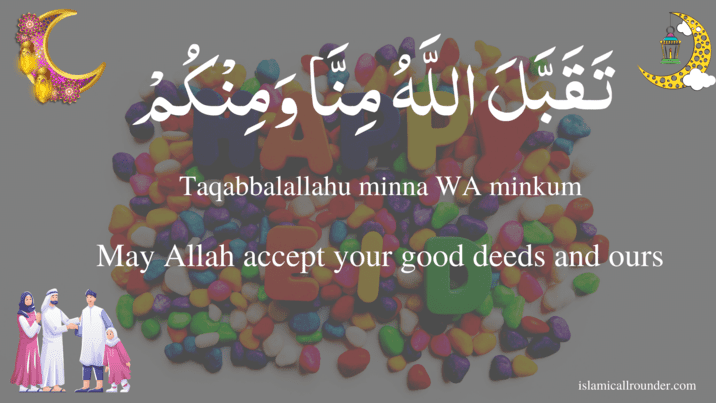Islam is a religion of nature. Like other religions, Islam celebrates special days of happiness, including Eid. On this occasion, all Muslims celebrate and congratulate each other.
In this way, mutual love is promoted. On this occasion, there is a special prayer, Taqabbalallahu minna wa minkum, which Muslims usually recite when they meet each other.

Do you know the meaning of this prayer? If not, let us guide you about it. To greet Eid is to pray Taqabbal Allahu minna wa minkum for its blessing, which is permissible in itself, so it is acceptable to greet one another on the occasion of Eid, but it is mustahabb.
Taqabbalallahu Minna Wa Minkum Meaning in English

The Companions of the Holy Prophet used to pray to each other: May your deeds be accepted in the sight of Allah and our deeds.
Allama Shami has quoted the researcher Ibn Ameer Hajj as saying that in Syria, people call each other “Eid Mubarak,” so this, too, can be included in the generality of this prayer, Taqabbalallahu.
Sunnahs & Manners of Eid Day
- I was cleaning my mouth with a toothbrush.
- Ghusl before going for prayers.
- Wearing good clothes means wearing the best clothes you have.
- Use good fragrance.
- I am performing Eid prayers in Eidgah.
- On the day of Baqar Eid, one should not eat anything before the Eid prayers (Rather, the first thing that should go into a person’s stomach on that day should be the sacrificial meat.
- Yes, on the day of Eid-ul-Fitr, one should eat an odd number of dates or any sweet thing before going for Eid prayers.
- Go to Eidgah early.
- I am saying takbeer aloud while going to Eidgah on the day of Baqar eid ul adha and saying takbeer slowly while going to Eidgah on Eid-ul-Fitr.
- I am going to Eid Gah one way and returning the other way.
- Sitting and listening to the sermon after Eid prayers. Sitting for the sermon is a definite Sunnah.
- It is obligatory to remain silent during the sermon and to listen to the sermon carefully.
- Offering supererogatory prayers in the Eid Gah before or after the Eid prayers is forbidden.
I woke up and worshiped on Eid nights. The heart of one who wakes up on the nights of Eid will be alive on the day when all hearts will die.
In what specific situations is “[Taqabbalallahu Minna WA Minkum]” recited?
The phrase Taqabbalallahu Minna WA Minkum is recited in various situations in Islam, including:
- During the recitation of the Quran, especially during the Taraweeh prayers in Ramadan.
- After completing the recitation of a Surah or a Juz’ (part) of the Quran.
- After completing the memorization of a Surah or a portion of the Quran.
- During the Adhan (call to prayer) and Iqama (second call to prayer).
- During the Tashahhud (testification of faith) in the prayer.
- After completing a good deed or a charitable act.
- During times of hardship, calamity, or difficulty.
- When seeking forgiveness for sins.
- When seeking Allah’s blessings and guidance.
In all these situations, the phrase Taqabbalallahu Minna WA Minkum is used to seek Allah’s acceptance and pleasure for the deed or act that has been performed. It is a powerful reminder of the unity and solidarity of the Muslim community and a call for Allah’s mercy and blessings.
The Importance of [Taqabbalallahu Minna WA Minkum] in Islam
Taqabbalallahu Minna WA Minkum holds great significance in Islam. It is a dua recited to seek Allah’s acceptance and pleasure. By repeating this phrase, Muslims express their humility, submission to Allah, and desire to please Him in all their actions.
Moreover, the phrase Taqabbalallahu Minna WA Minkum powerfully reminds the Muslim community of its unity and solidarity. When Muslims recite this phrase together, they express their shared faith and their common goal of seeking Allah’s pleasure.
In addition, the phrase Taqabbalallahu Minna WA Minkum is a powerful tool for seeking forgiveness for sins. By reciting this phrase with sincerity and devotion, Muslims express their remorse for their past mistakes and desire to start anew.
Taqaballahu Minna Wa minkum Explanation
A Muslim who resembles people and is patient with their sufferings is better than a Muslim who does not meet people and does not tolerate their suffering.
The most beloved of people to Allah is the most beneficial to others. In Allah’s sight, the most beloved deed is to spread happiness in the heart of a Muslim and to run a wave of joy. After fulfilling one’s duties, Allah’s most cherished act is to please the Muslims.
A striped cloth was brought to the Holy Prophet. He asked where is Umm Khalid? She was the daughter of Hazrat Abu al Aas, and she was very young. She was born in Abyssinia. The baby was presented in the service of the Holy Prophet. Gone, you started wearing that cloth yourself.
The girl was looking at this striped cloth with great pleasure. When you clothed him, pointing to his colorful stripes, he said: O Umm Khalid! She is beautiful. O Umm Khalid! She is beautiful.
One of the forefathers passed by the children engaged in play. After seeing the children, they returned, bought, and distributed sweets. When they were asked the reason, they replied:
I used to earn rewards from such deeds and share happiness, and these children are happy with very little money. We should also share our joy with other people. We should try not to cause any sorrow to any human being from our caste, but we should be the cause of sharing happiness for humanity.
